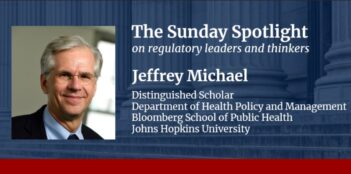
A new casebook reintroduces tools to address critical issues in sectors such as transportation, energy, finance, and technology.
The law of networks, platforms, and utilities (NPUs) once occupied a core position in legal scholarship and education. Its centrality in American life was widely recognized—from union halls and board rooms to state houses and universities. According to Felix Frankfurter, who taught public utilities at Harvard Law School for 19 years and served on the U.S. Supreme Court for 23 years, “no task more profoundly tests the capacity of our government” than “securing for society those essential services which are furnished by public utilities”—such as “light, heat, power, water, transportation, and communication.”
But in recent decades, what we are calling NPU law—which has gone by “regulated industries,” “public utilities law,” “the law of public service corporations,” and “the law of common carriers”—has all but ceased to exist as an integrated field of study. Significant intellectual and cultural shifts drove this change. In the closing third of the 20th century, the long-prevailing view that the public interest demanded a substantial measure of public control over society’s infrastructural resources gave way to a bipartisan distrust of public administration and an abiding faith in the self-regulating power of markets. In the process, deregulatory initiatives “transformed” NPU law, and its animating concepts dropped out of the legal and political imagination.
We believe that it is time to revive and refashion this field. To this end, we have just published a new casebook entitled Networks, Platforms, and Utilities: Law and Policy.
NPU law needs reviving for three primary reasons.
First, many of today’s most pressing public policy challenges are directly tied to NPUs. Consider the following challenges in the transportation, communications, energy, monetary-financial, and tech sectors:
- Flight cancellations due to staffing shortages are frequent, ticket prices are high, passenger satisfaction is low, and airlines are dropping cities from their networks. In the past two decades, nearly every major U.S. airline has entered bankruptcy, received taxpayer bailouts, or both.
- Millions of Americans, particularly in rural areas, lack access to reliable broadband internet.
- Climate change is severely straining an aged electric grid. In 2021, for example, unprecedented winter storms—coupled with inadequately weatherized infrastructure—crashed the electricity grid in Texas. Power was down for days in freezing cold temperatures, causing hundreds of deaths.
- “Nonbank money,” according to a report by the Federal Reserve, “in large part” caused the 2008 financial crisis, which cost millions of Americans their jobs and fueled the country’s increasing political polarization. Meanwhile, cryptocurrency entrepreneurs are aggressively promoting a new form of nonbank money.
- The internet giant Amazon uses its massive e-commerce platform to replicate the popular features of products offered by small businesses and offer copycats under its own “private label” brand, according to a 2020 congressional investigation. The company then allegedly suppresses and even suspends the original sellers from its online marketplace.
In each of these examples, and many more, serious economic and social problems are tied to the governance of infrastructural industries.
Second, examining these problems in isolation—and regulating them ad hoc—is a mistake. Not only does separate treatment prevent policymakers from translating relevant experience and lessons from one domain to others, but it also obscures the broader implications of governing infrastructural goods for economic prosperity, social cohesion, and democracy.
Third, we now have 40 years of experience with the deregulation of NPU industries, which allows us to understand how deregulation worked (and did not), what predictions were right (and wrong), and what the positive (and negative) consequences have been.
We should learn from this experience. For example, experience can teach a great deal about the likelihood that competition will work or the consequences of eliminating structural separations. Such lessons will be valuable in addressing current policy challenges.
More broadly, the United States is in a moment of reconsidering the neoliberal ideas that dominated many areas of law and policy. From antitrust to trade, scholars and policymakers increasingly believe that the deregulatory moves of the last 40 years went too far—and that earlier approaches to economic governance deserve reconsideration.
While we think it is time to revive regulated industries, we believe the field must be refashioned as well, which is why we use the phrase NPU law throughout our new book.
This choice is not merely a branding exercise. Previous treatments were incomplete even in their day. None, for example, covered money, payment systems, financial market infrastructure, or computer operating systems. Yet the NPU framework explains a great deal of how federal banking laws are designed—and brings a great deal of clarity to much of the history and debates over financial regulation. Dominant tech platforms have also emerged in recent years, raising anticompetitive concerns that parallel those leveled against the telegraph and railroads. It is no surprise, therefore, that commentators on the right and left have recognized that tech companies could perhaps be regulated as utilities or common carriers.
Ours is the first entirely new casebook integrating the law of networks, platforms, and utilities in a quarter century—and the first with some temporal distance from the deregulatory movement of the late 20th century. We think it is past time for a modern, comprehensive approach that pushes the field back to the center of legal education and scholarship and reintroduces its tools and logic to policymakers.
We hope the book will help scholars, students, and policymakers better understand how critically important sectors of the economy have been governed—and how the tools of NPU law can help address some of the most pressing problems of our time.







